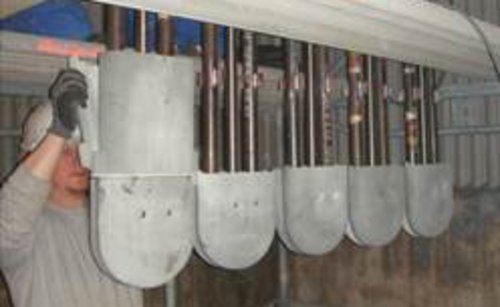Radiant superheaters
The project with the objective of developing and trialling a corrosion-protected radiant superheater for increasing the efficiency of thermal waste treatment plants and comparable plants with high corrosion was first reported in the year 2012. This project was successfully completed in November 2014.
Primary energy savings and a reduction in CO2 emissions
Due to the increased steam parameter, the electrical efficiency of such an incineration plant can be increased significantly, which leads directly to primary energy savings and a reduction in specific CO2 emissions during electricity production.
Another advantage is that components at risk of corrosion in the area of the contact heating surfaces are moved into the combustion chamber and there they are provided effective protection. In this way, not only can efficiency be increased but also the stoppage times reduced, and under certain boundary conditions the throughput can also be increased. Increasing the steam temperature generally proves to be difficult. At times substantial corrosion effects are known of even in plants with the usual steam temperature of 400 °C. Effective and reliable protection systems are currently not available on the market.
Many plant operators try to use new materials, for example, Inconel 686, or new processes, for example, thermal spraying, in order to extend the lives of the superheaters. The experience acquired to date is not clear. In some plants these protection systems function satisfactorily, but in other plants they fail completely.
Conclusion
Based on the operating experience with radiant superheaters acquired in the project, the concept of overcoming the limits set to date by corrosion appears to stand the test.
Therefore, the use of a radiant superheater becomes relevant in Bavaria in all energy generation plants in which comparatively severe corrosion occurs due to the fuels used and an increase in performance can be achieved via higher steam temperatures. Here, for example, use in biomass plants would be possible, in which the input of potassium causes very high stressing of the boiler materials, which in the tests could not be controlled at high temperatures even with very sophisticated materials. Due to the very limited investment situation for new plants, upgrading, optimisation and extending existing thermal waste treatment plants is increasingly becoming more important. This is seen as an important market for the radiant superheaters. The concepts for upgrading 20 or 30 year old plants are tremendously important.
In addition to Rosenheim waste incineration plant, the project partners were Martin GmbH and CheMin GmbH. The project was co-funded by the European Union, with money from the European Fund for Regional Development and the Bavarian State Ministry of the Environment and Consumer Protection.
![[Translate to Englisch:] Placeholder](/fileadmin/_processed_/e/b/csm_Header_Projekte_603d83e502.jpg)
